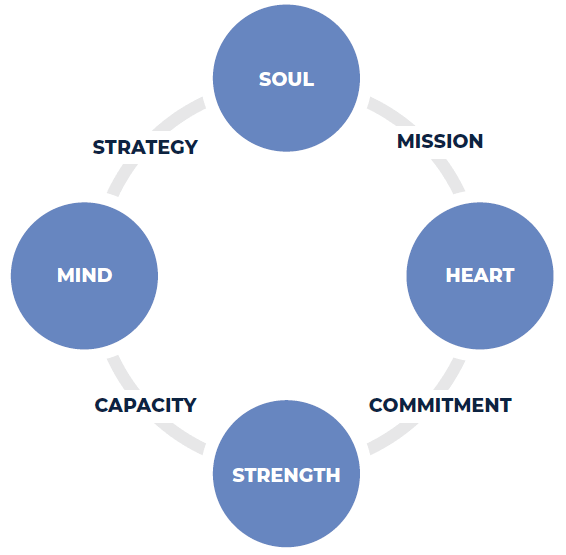
New Strategic Plan for Providence
As Providence enters its second century of service, we embrace a new adaptive strategic plan that reaffirms our mission and strengthens our capacity for the future. Rooted in the biblical commandment to love God wholeheartedly, this plan is designed to foster growth in both knowledge and character, preparing our students for leadership and service.
The Framework
Providence’s strategic plan is structured around the biblical commandment to love God with heart, soul, mind, and strength (Mark 12:30). This commitment translates into four areas of emphasis:

MISSION
Providence is dedicated to fostering growth in knowledge and character for leadership and service.
COMMITMENT
Providence is committed to its core values: prioritizing Christ as the centre for all that is done, embracing diversity of thought, fostering community, encouraging exploration, and pursuing academic excellence both inside and outside the classroom.
CAPACITY
Providence has a committed faculty and staff and a beautiful, though aging, rural 100-acre campus in Otterburne. While sometimes constrained by limited financial and human resources, the institution is committed to increasing capacity through alumni support, strong academic programs, and dedicated governance. Providence aims to attract more students and donors, strengthen and revitalize its main campus, and grow its public reputation and visibility.
STRATEGY
With continued reliance on God’s guidance and provision, Providence will work strategically toward its short and long-term goals. Focused efforts will be made to plan carefully and establish the appropriate timelines, budgets and methods of continuous assessment.
IMPLEMENTATION
Identity & Mission
Providence maintains its Christian identity and foundational commitment to theological principles. The institution’s mission involves training students for leadership and service, focusing on cultivating character and faith-based values within an academic context.
Some key mission-oriented goals include regularly reviewing Providence’s vision and values, exploring student expectations in an open-enrollment context, enhancing campus worship spaces, increasing public faith-focused events, and adjusting courses offerings to meet the needs of a diverse student body.
Academic Programs
Through deepening programming in areas such as Science and Business Management while seeking to establish new programs that will appeal to the marketplace, Providence is looking to expand its offerings to prospective students and to become more competitive and productive.
Physical Resources & Infrastructure
Providence is prioritizing renovations to its Otterburne campus, requiring substantial investment over the next few years to enhance functionality and accessibility. These improvements aim to strengthen the campus experience, making Providence more attractive to potential students and donors.
Institutional Structure
Providence is examining its structure as a university, seeking ways to better delineate the roles of various schools, such as the Buller School of Business and the Centre for On-Demand Education. In dialogue with government and accreditors, Providence plans to advance its formal status and improve its public perception.
Execution & Adaptive Planning
A core component of this strategic plan is its iterative, flexible approach. Recognizing the need for ongoing adaptation, Providence proposes regular review cycles by its Board of Governors and leadership to assess progress and adjust strategies. This flexible approach ensures responsiveness to external conditions, such as regulatory changes and market demands.
Community & Financial Health
Providence acknowledges the need to build stronger relationships with alumni and donors to secure long-term financial health. The strategic plan emphasizes improving financial management, reducing debt, and establishing endowment funds for sustainability. By strengthening ties with alumni and broadening its donor base, Providence aims to create a steady flow of resources for its programs and infrastructure.
Faculty & Staff Development
Human resource improvements are critical to Providence’s success, including competitive salaries, health benefits, and clear role expectations. The plan calls for comprehensive assessments of compensation and staffing needs to attract and retain qualified employees. This is seen as essential for maintaining morale and ensuring a sustainable commitment to the institution’s mission.
